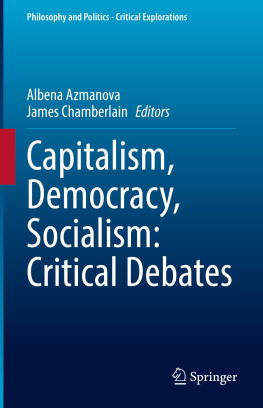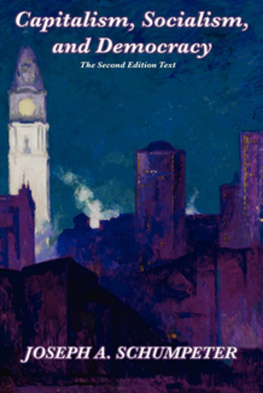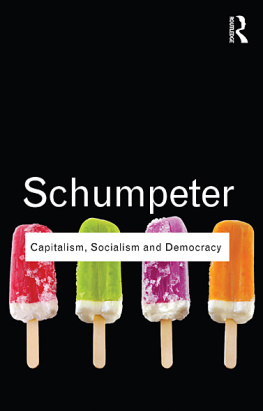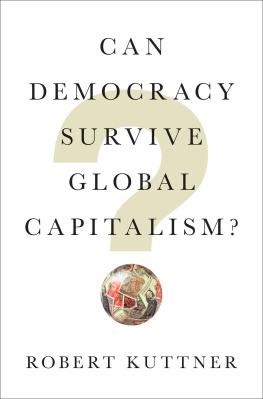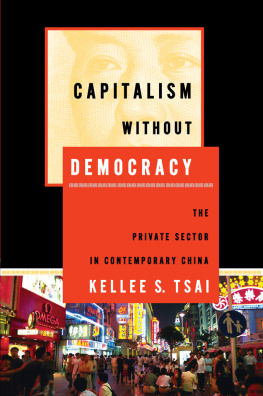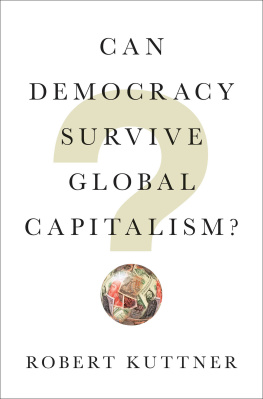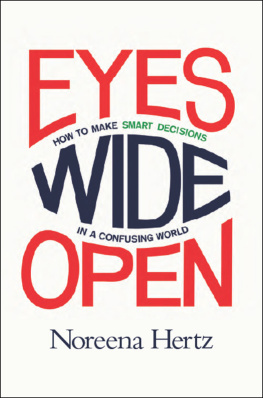Hertz - The Silent Takeover: Global Capitalism and the Death of Democracy
Here you can read online Hertz - The Silent Takeover: Global Capitalism and the Death of Democracy full text of the book (entire story) in english for free. Download pdf and epub, get meaning, cover and reviews about this ebook. City: Riverside, year: 2002, publisher: Simon & Schuster;Free Press, genre: Politics. Description of the work, (preface) as well as reviews are available. Best literature library LitArk.com created for fans of good reading and offers a wide selection of genres:
Romance novel
Science fiction
Adventure
Detective
Science
History
Home and family
Prose
Art
Politics
Computer
Non-fiction
Religion
Business
Children
Humor
Choose a favorite category and find really read worthwhile books. Enjoy immersion in the world of imagination, feel the emotions of the characters or learn something new for yourself, make an fascinating discovery.
The Silent Takeover: Global Capitalism and the Death of Democracy: summary, description and annotation
We offer to read an annotation, description, summary or preface (depends on what the author of the book "The Silent Takeover: Global Capitalism and the Death of Democracy" wrote himself). If you haven't found the necessary information about the book — write in the comments, we will try to find it.
Hertz: author's other books
Who wrote The Silent Takeover: Global Capitalism and the Death of Democracy? Find out the surname, the name of the author of the book and a list of all author's works by series.
The Silent Takeover: Global Capitalism and the Death of Democracy — read online for free the complete book (whole text) full work
Below is the text of the book, divided by pages. System saving the place of the last page read, allows you to conveniently read the book "The Silent Takeover: Global Capitalism and the Death of Democracy" online for free, without having to search again every time where you left off. Put a bookmark, and you can go to the page where you finished reading at any time.
Font size:
Interval:
Bookmark:


THE FREE PRESS
A Division of Simon & Schuster, Inc.
1230 Avenue of the Americas
New York, NY 10020
Copyright 2001 by Noreena Hertz
Originally published in Great Britain in 2001 by William Heinemann
All rights reserved,
including the right of reproduction
in whole or in part in any form.
T HE F REE P RESS and colophon are trademarks
of Simon & Schuster, Inc.
Visit us on the World Wide Web:
http://www.SimonSays.com
ISBN-10: 0-7432-4189-4
ISBN-13: 978-0-7432-4189-2

Dancing with the Pink Fairies J-20. For those in the know the acronym is easily decipherable: July 20, 2001, the call for action transmitted to hundreds of thousands at the click of a mouse. J-20Genoa.
I first learned about the Genoa protests through the Net, as did most of those who gathered there. A chain letter sent to thousands and forwarded to thousands more eventually reached me. Cyberwar with a clear message: Be there, if you think that globalization is failing. Be there if you want to protest against global capitalism. If you think multinational corporations are too powerful. If you no longer believe your elected representatives will listen. Be there if you want to be heard.
On July 20, Genoa was host city to the G8 annual summit, and the place to be for the veterans of Seattle, Melbourne, and Londons City and Parliament Square riots, for the veterans of Washington, Prague, Nice, Quebec, and Gothenburg (if veterans is the appropriate term for a movement only a couple of years old). They flocked there in droves: pink fairies in drag, red devils handing out Boycott Bacardi leaflets, Italian anarchists in game-show padded body armor, environmentalists with mobile phones, suburbanites with cameras snapping as if they were on a day trip to the big citya babel of different languages and different objectives gathered under the one anti banner.
I was prepared for the tear gas: I had read the California-based Ruckus Societys handbook, required reading for protesters, and had brought the requisite lemon and vinegar and a handkerchief to wrap around my face, as well as fake blood in a traveling shampoo container (good when you want to get let through a crowd). I was prepared for the police standoffs: I had studied the tactics of civil disobedience and direct action at the nonviolence workshop I had attended earlier that year in a hangarlike meeting place on the northwest outskirts of Prague. Although nothing could have fully primed me for the brutality of the Italian police.
What I was not prepared for was the extent of the sense of community among the divergent and often conflicting interests, the sense of camaraderie and unity around a shared opposition to the status quo. Neither was I prepared for the sheer rage, inflamed by the insistent drumming and by the mournful wailing of the rainbow-stringed whistles sold at a dollar a piece: the black bloc anarchists intent on smashing shop front windows; the focus of many around me on tearing down the fence that the Italian authorities had erected to keep the world leaders in and the world protestors out.
Least of all, perhaps, was I prepared for the extent to which those I spoke with were utterly disillusioned with politics and politicians, corporations and businesspeople alike, and the lengths to which they were prepared to go to break what they saw as a conspiracy of silence. The bare-chested young man with arms splayed in the sign of a pacifist, who remained upright despite the fire of a water cannon pounding against his back; Venus, the girl with pink hair and glitter stars stuck on her eyes, who told me in a soft Irish lilt that she was willing to die for this cause.
Ten years after the tanks last drove onto Red Square, twelve years after the Berlin Wall came down, after the longest period of economic boom in modern times, dissent is nevertheless growing at a remarkable rate, voiced not only by the hundreds of thousands who gathered in Genoa or Gothenburg, Prague or Seattle, not only by the rainbow warriors, but by disparate and often surprising partiesordinary people with ordinary lives, homemakers, schoolteacherssuburbanites and city dwellers, too. All over the world, concerns are being raised about governments loyalties and corporations objectives. Concerns that the pendulum of capitalism may have swung just a bit too far; that our love affair with the free market may have obscured harsh truths; that too many are losing out. That the state cannot be trusted to look after our interests; and that we are paying too high a price for our increased economic growth. They are worried that the sound of business is drowning out the voices of the people.
The fairy-tale ending of the story that began in Westminster on May 3, 1979, the day Margaret Thatcher came into power, and was later reproduced in the United States, Latin America, East Asia, India, most of Africa, and the rest of Europethe story of the streets being paved with gold, and the realization of the American dreamis no longer taken for granted. Myths that were perpetuated during the cold war era, out of fear of weakening our position, are beginning to be debunked. Wealth doesnt always trickle down. There are limits to growth. The state will not protect us. A society guided only by the invisible hand of the market is not only imperfect, but also unjust.1
The world that is emerging from the cold war is the antithesis of the shrink-wrapped One World of the hyperglobalists. It is in fact confused, contradictory, and mercurial. It is a world in which a litany of doubts is starting to be recited, not at the ballot box, but in cathedrals, shopping malls, and on the streets. A world in which loyalties can no longer be determined, and allegiances seem to have switched. While BP was running a program for its top two hundred executives on the future of capitalism in which the merits and demerits of globalization were debated, a British Labour government was fighting to privatize air traffic control.
The Space Odyssey world of 2001 is getting dangerously close to the apocalyptic visions of Rollerball, Network, and Soylent Green. It is a world in which, as we will see, corporations are taking over from the state, the businessman becoming more powerful than the politician, and commercial interests are paramount. As I will show, protest is fast becoming the only way of affecting the policies and controlling the excesses of corporate activity.
The Benetton Bubble
We can date the beginning of this world, this world of the Silent Takeover, from Margaret Thatchers ascendency. The hairspray-helmeted Iron Lady proselytized a particular brand of capitalism with her compadre Ronald Reagan that put inordinate power into the hands of corporations, and gained market share at the expense not only of politics but also of democracy. And it has been a durable product. Apart from a few discreet tweaks, theirs remains the dominant ideology across much of the world. Politics in the post-cold war age has become increasingly homogenized, standardized, a commodity.
Benetton provides an apt metaphor for politics today. Over the last eighteen years this Italian fashion company has run the most provocative advertising campaigns ever seen. Twenty-foot billboards with the picture of a starving black baby; the AIDS victim at his moment of death; the bloodied uniform of a dead Bosnian soldier; the United Killers of Benetton campaign, a ninety-six-page magazine insert with photograph after photograph of condemned prisoners languishing on Americas death rows. Benetton shocked us to attention, but shock is all it provided. It didnt rally us into action. Nor did it try and address these issues itself. Their advertising provided no exploration of the morality of war, there was no attempt to relieve poverty or cure AIDS. The only goal was to increase sales, not to start a discussion of the issues behind capital punishment. And if it profited from others misery, so what?2
Font size:
Interval:
Bookmark:
Similar books «The Silent Takeover: Global Capitalism and the Death of Democracy»
Look at similar books to The Silent Takeover: Global Capitalism and the Death of Democracy. We have selected literature similar in name and meaning in the hope of providing readers with more options to find new, interesting, not yet read works.
Discussion, reviews of the book The Silent Takeover: Global Capitalism and the Death of Democracy and just readers' own opinions. Leave your comments, write what you think about the work, its meaning or the main characters. Specify what exactly you liked and what you didn't like, and why you think so.

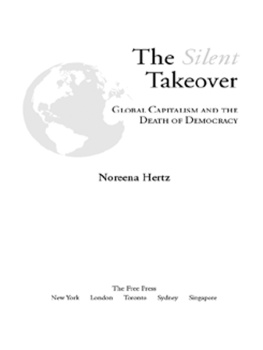

![Hertz - Scheik Hassan, Lystspil i tre Acter [in prose and verse]](/uploads/posts/book/182877/thumbs/hertz-scheik-hassan-lystspil-i-tre-acter-in.jpg)


